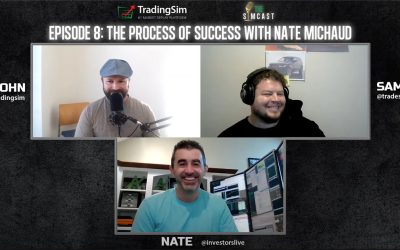Time and time again, we see new traders enter the markets trying to make a fortune overnight. These traders, fueled with ambition and high hopes, view day trading as a lottery ticket rather than a high-level skill that takes years to develop. This disposition alone is enough to hinder a new trader. Expecting to strike gold within a short period of time is a naive assumption that relies heavily on pure luck. Essentially, this mentality shifts the responsibility of success from you, the trader, to random factors that are out of your control. Account for the fact that 90% of traders fail and you’re now brewing a recipe for disaster.
Don’t be mistaken; this isn’t to say that setting ambitious goals should be perceived as a negative trait, nor is this post intended to berate those who do. Instead, this post is focused on having you change your mindset, thus allowing you to repave the path you need to take to get where you want to go. Becoming a solid trader takes time, hard work, and, often times, failure. To ignore this would be foolish. I’m not saying to lower your standards. I’m saying that you need to be realistic with your plans to achieve your goals. We’ve talked about how you can set better goals in another post, and I always stress the fact that consistency is key. So, what does all of this mean for your trading?
Trading takes time. Some of you may be familiar with the book The Outliers by Malcolm Gladwell. In this book, Gladwell discusses the findings of his research on successful members of society. He claims that it takes roughly 10,000 hours to master a skill. This finding is based on Gladwell’s research on some of the most influential members of our society, ranging from Bill Gates to the Beatles. You may be wondering why I’m bringing up this reference. After all, this is a trading community not a book club. I bring it up because it speaks to a few key points about trading.
Becoming a Day Trader: You need to put in the hours
Gladwell claims that it takes 10,000 hours to master a subject. If you don’t believe that, that’s fine; take it up with Gladwell. In no way am I claiming that it takes 10,000 hours to see the results you want. For our purposes, this as a broad concept, not a golden rule. I’m not proposing that you need to spend 10,000 hours studying the market before you can become successful. After all, our trading courses are only 10+ hours. I am, however, supporting the idea that mastering the art of trading requires consistent practice and studying. Sure, you may get lucky, but if you really want to become a great day trader you need to constantly be working on your craft. There is no replacement for hard work. Study educational material, observe the markets, paper trade, place real trades, etc. The more ingrained you become in the market and the more hours you put in, the better off you will be.
Natural Talent is Irrelevant to Day Trading
The thought that you need to have some sort of “natural talent” to succeed at day trading can be discouraging. Sure, some people are better at math, reading charts, or analyzing a business, BUT these skills can also be acquired through time. Many of the traders at Investors Underground have a broad range of backgrounds, many not related to the finance niche. Gladwell claims that successful individuals are not born with their skill; they put in the effort to develop it. This concept should be inspiring to traders seeking to improve their current results. It means that anyone who puts in the proper efforts has the chance to achieve their desired results.
Here are some of the interviews from traders in our room:
Learn from the Successful Day Traders
When Gladwell was preparing his hypothesis for the “10,000-hour rule” he went straight to the source. He studied the minds of people who have proven to be successful. He studied their behavior from a young age all the way up to their big success. The same approach can be applied to trading. Study the behavioral patterns of successful traders and pick their minds if you get the chance. There’s no better way to learn than from those who have already achieved what you’ve set out to accomplish. This isn’t to say you should be idolizing successful day traders: not in the least bit. You should, however, focus on what they did to become successful, and attempt to emulate those behavioral patterns.
Conclusion
Understanding the work involved in becoming a successful trader allows you to take a realistic approach to your trading. This can keep you from placing risky trades that can blow up your account. It also allows you to celebrate the successes along the way. If you’re expecting to make $100,000 in your first month of trading, making $200/day for 5 days in a row may seem insignificant. Contrarily, if you understand that trading takes time, you can celebrate the fact that you’re on your way to being a successful trader. You can try to find ways to expedite your success but you shouldn’t expect to find shortcuts. Sure, you should be working smart instead of working hard, but trying to find a way to hack success is risky, especially when putting your capital on the line in the markets.








Nothing wrong with referencing books. I’m always keen to hear about other tools that can aid us in the journey. Books, personal development programmes etc.. all welcomed. Thanks Nate.
Point well made. Good job Nate
Sir, first I have to say that I agree the views that efforts are necessary but I ask you too what a man can do if he had not any communication with you like such a computer with internet, it is luck, sir, i had this choice of using internet at the age of 66 years, you know that at this age a lot of people tries to wait for death. Sir if you desire me to do hard work of training for a job of trading which i dose not know even what this, you wish to believe that Ican follow you. But how, if you have an answer to this please do this ,otherwise try to pray for me or anything else may be disclosed to me which I may be able to do because it is necessary to get some earning for day to day life. Sir, my ideas/answer has become too long for which I apologies. Thank you for patience & for giving opportunity to join you again As for as I have a link like this, I mean internet as when, for fate, I losses this you will not be able neither to discuss me or give directions. I am sorry for this late too. However I will try my best to continue for as while as I could do.
Thanks for the info and advice to help me keep grounded. I completed both of your DVDs and while I have a better understanding of trading I still feel a little lost in the chat rooms. Hopefully with time my confidence will increase!
Liquids: yeah, I know that feeling. It’s been 2.7 years since I’ve visited IU off and on. Both my first two times were info overload, I just now got to where I can see the ABCD patterns. And they don’t always text book work out, so I had to adjust my profit taking, and that has been giving me consistency. In May I lost $, but learned a niche in how I do ABCD. 1) be patient on entry 2) take profit early * contrary to Nate’s text book teaching to wait for D. Because D is worth missing for sake of profiting now, until I keep improving. 2.7 years and I’m just now seeing if I will be consistent in June. Not to mention time to live, breath, exercise, drive my cab, and keep up friendships and relationships worth having
I’ve been trading off and on last 40 years, I recently have taken it up again, that said I have always been a fan of candlestick patterns and can normally can spot a pattern within a few seconds of looking at a chart, all that said in last 6 weeks I took my 100k account and traded it up to $400k, I m always learning something new about candlestick patterns and would like to learn what you are offering.
Putting in the time and learning are all fine and good, but as humans, we like instant gratification. To trade and learn at the same time, is to lose money, and I should not have to lose money to learn. Just because those who came before me lost money as they learned, doesn’t mean I should have to lose money now. Those successful traders who are now making money teaching, should be showing the new traders how to trade with them during the market hours, and they can study the lessons after-hours, and also what was shown during the day, trading with the teacher.
I agree.
I always like your post/advise. They are simple, straightforward and very real.
Sir, Thank you for your many valuable advices.
Hey Nate and Cam, I really enjoyed that discussion and took notes. All the guests you feature and email out to us are great, especially when the discussion is current. Keep them coming! Paul